Key takeaways:
- Choosing the right app development tools can significantly streamline workflows and enhance the final product.
- Open-source solutions offer flexibility, customization, cost-effectiveness, and strong community support, fostering collaboration and innovation.
- Popular open-source tools like Flutter, React Native, and Apache Cordova empower developers to create efficient applications across multiple platforms.
- Challenges include a steep learning curve, inconsistent community support, and integration issues, which require careful consideration against the benefits.
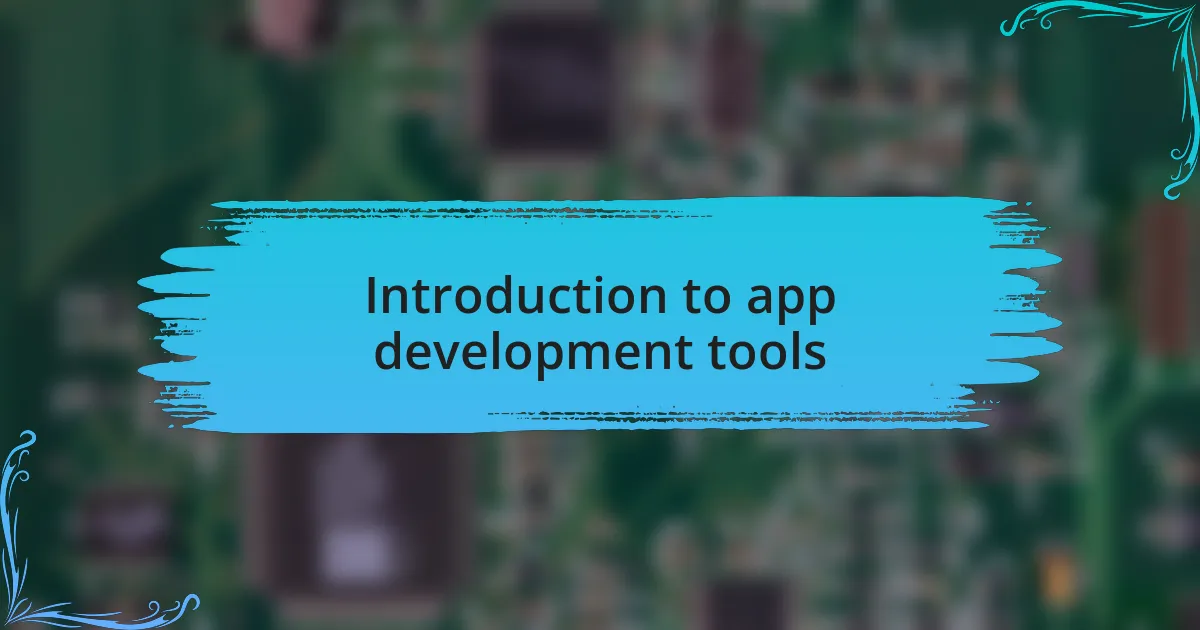
Introduction to app development tools
App development tools are the backbone of creating functional and engaging applications. From my experience, choosing the right tools can shape not only the development process but also the final product. Have you ever felt overwhelmed by the sheer number of options available? I certainly have, and it often felt like standing at a crossroads with many paths to choose from.
When I first dipped my toes into app development, I was amazed at how the right tools could streamline my workflow. I remember struggling with a basic project until I discovered an open-source platform that simplified coding and collaboration. It was like finding the perfect paintbrush for a canvas – everything just flowed smoothly, and my creative ideas came to life more easily.
It’s fascinating to think about how these tools can tailored to fit individual needs. Each developer has a unique vision, and the right tool can bring that vision to fruition. Have you found a particular tool that resonates with your style? Reflecting on my journey, I believe it’s essential to experiment with various options to discover what aligns best with your own development approach.
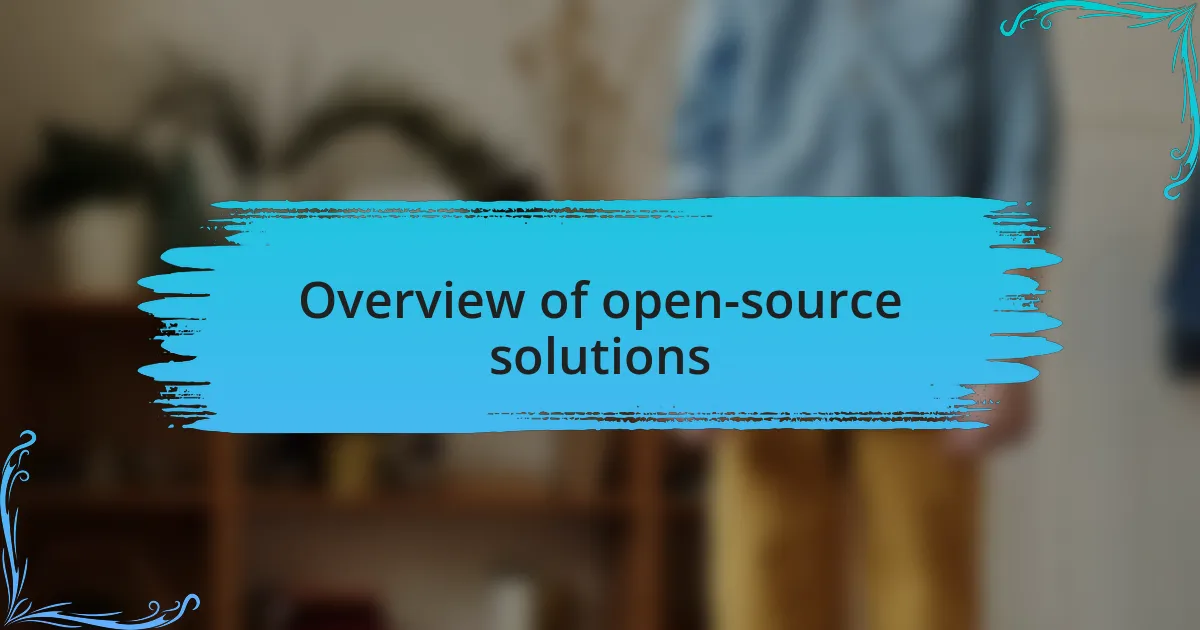
Overview of open-source solutions
Open-source solutions provide a treasure trove of opportunities for developers at any stage. When I first encountered an open-source framework, I was pleasantly surprised by the community-driven support that came with it. Have you ever felt the excitement of diving into a project knowing you can tap into the collective knowledge of countless contributors? It creates an invigorating atmosphere that encourages exploration and growth.
One key aspect of open-source solutions is their flexibility. Unlike proprietary tools, they can be customized and adapted to meet specific project needs. I vividly recall a time when I needed to modify a functionality for a client’s app. The open-source nature allowed me to tweak the code effortlessly, which saved time and ultimately led to a more satisfied client. Have you ever wished for that kind of control over your development environment? That’s the beauty of using open-source tools; they empower you to mold your projects as you see fit.
Moreover, the cost-effective nature of open-source solutions cannot be overlooked. With the financial constraints that many developers face, finding robust tools without the hefty price tag can be a game-changer. I remember working with a startup that needed powerful software but had a limited budget. By leveraging open-source options, we not only harnessed great technology but also preserved resources for other essential areas of our project. Isn’t it reassuring to know that high-quality solutions can be accessible to everyone?
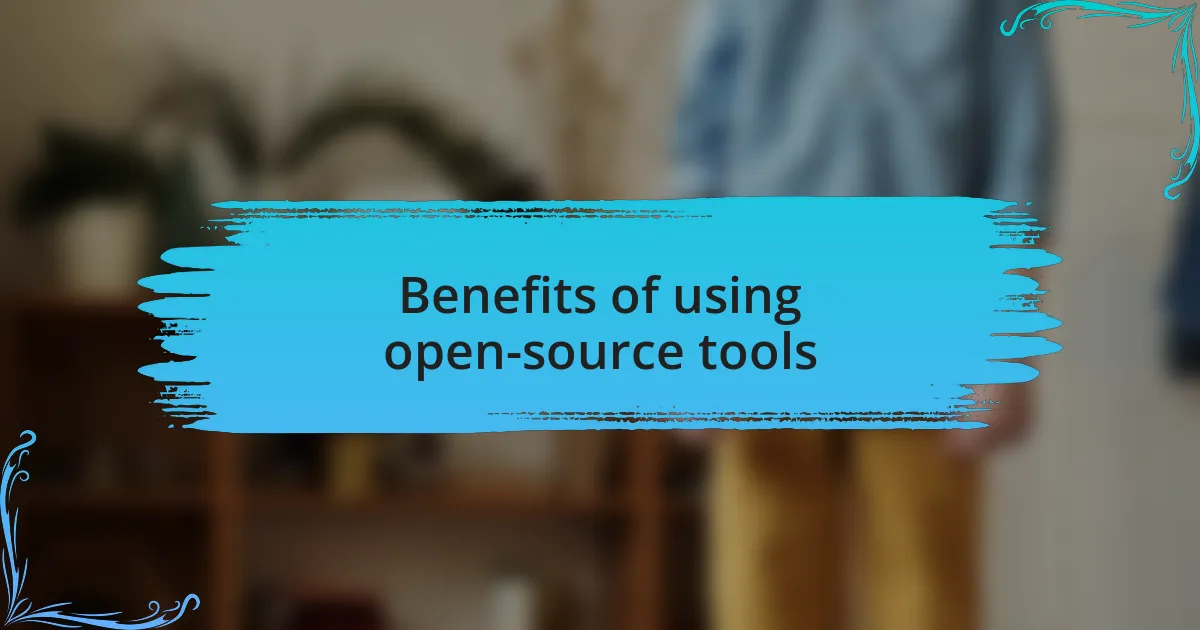
Benefits of using open-source tools
When working with open-source tools, I often find a strong sense of community that enhances the development experience. During a recent project, I reached out to an online forum for help on a specific coding issue. The swift and supportive responses I received felt like a safety net, reminding me that I wasn’t alone in my challenges. Isn’t it comforting to know you can rely on others who share your passion?
Another remarkable benefit is the continuous improvement and innovation that comes from the open-source model. I’ve taken part in projects where contributors from across the globe enhance the software, introducing features that I hadn’t even thought of. It’s like being part of a collaborative brainstorming session that never ends! How often do you get to witness firsthand the evolution of a tool you love?
Lastly, the transparency of open-source tools fosters trust and security. I remember when I needed to evaluate the safety of a library I wanted to use. I could dive into the code to check for vulnerabilities rather than taking someone’s word for it. This level of access not only provides peace of mind but also allows me to develop more robust applications. Have you ever experienced that sense of empowerment in knowing exactly what’s behind the curtain?
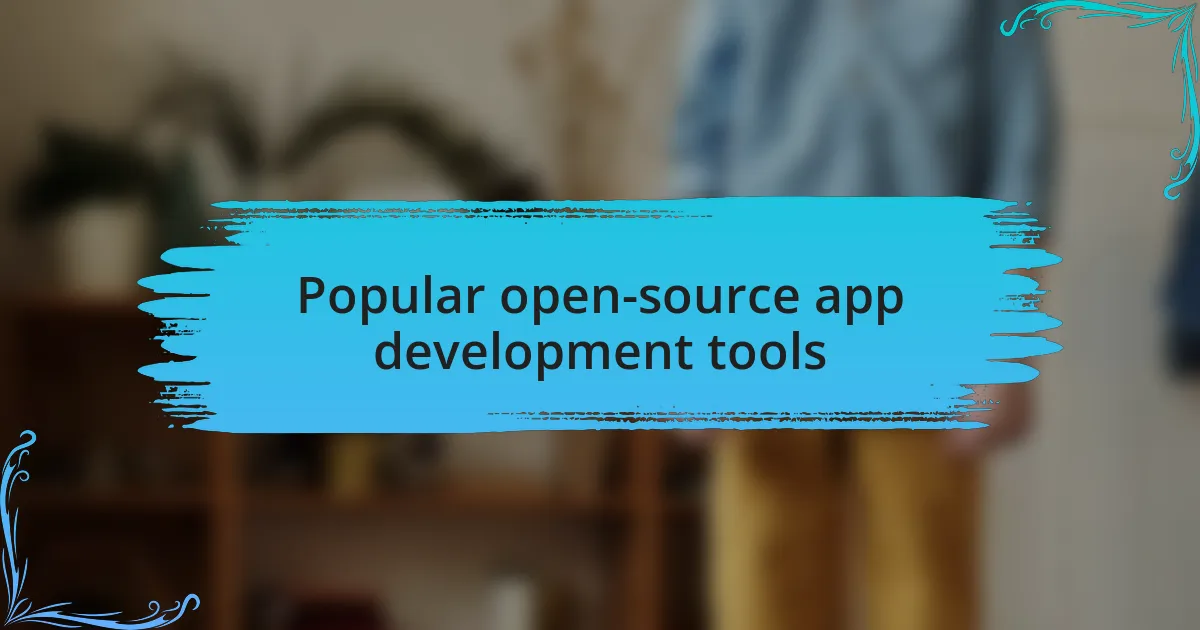
Popular open-source app development tools
One of my go-to open-source app development tools is Flutter. This UI toolkit, created by Google, has completely transformed the way I’ve approached mobile application development. The power to build natively compiled applications for both iOS and Android from a single codebase is incredible. Have you ever found yourself juggling multiple platforms? With Flutter, I could streamline that process, making my projects not only more efficient but also enjoyable.
Another tool I highly recommend is React Native. I remember diving into a project where I needed immediate results and found that React Native allowed me to create a stunning user interface with minimal effort. The hot-reload feature was a game-changer; seeing changes in real-time while tweaking the code felt exhilarating. It’s like having a painting where the colors appear as soon as you dip your brush. Have you experienced a moment in development where a tool just clicks with your workflow?
Lastly, I can’t overlook Apache Cordova. When I first explored this tool, I was impressed by its ability to leverage web technologies like HTML, CSS, and JavaScript to build mobile applications. I fondly recall the thrill of seeing my first hybrid app come to life, functioning seamlessly across different platforms. It was a reminder that not all great apps require starting from scratch—sometimes, you can utilize what you already know and create something wonderful. Have you ever realized that a familiar skill set can lead to entirely new achievements?
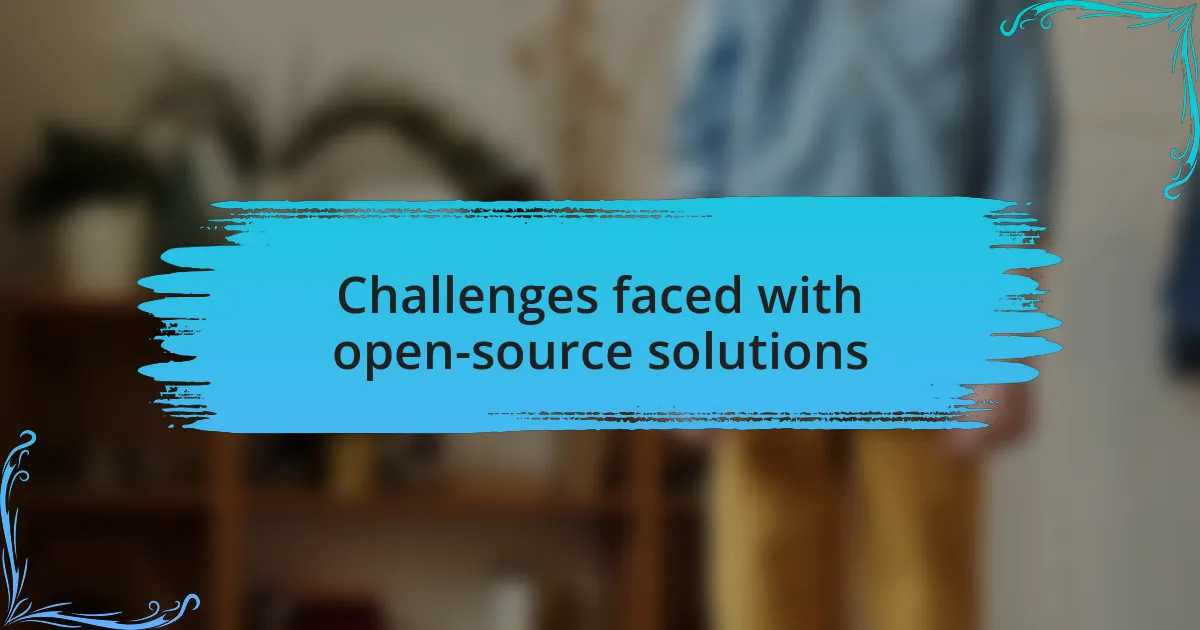
Challenges faced with open-source solutions
When diving into open-source solutions, one challenge that often caught me off guard was the steep learning curve. I recall starting with a complex tool and spending hours hunting for documentation or tutorials. Have you ever felt lost in a sea of code, unsure where to turn next? It can be daunting, especially when tools are constantly evolving, and keeping up can feel like a full-time job.
Another hurdle I’ve faced is the inconsistency in community support. For instance, I once turned to forums after encountering a bug, only to realize that responses were sparse and scattered. It made me appreciate how reliant we can become on community engagement. Have you ever found yourself waiting for a lifeline from others only to feel like you were adrift? The lack of a dedicated support team can lead to frustrating delays.
Lastly, I’ve experienced issues with integration when using open-source tools, particularly when trying to combine various libraries. In one project, I vividly remember the chaos of incompatible versions wrecking my build. It made me question whether the flexibility of open-source was worth the headaches. Have you found that balancing the pros and cons of these tools sometimes feels like a high-wire act? It’s essential to weigh these challenges against the value they can bring to your projects.